Unit 3 Back to the past Project(1)_ Making a poster about a historical figure课件(25张)
文档属性
| 名称 | Unit 3 Back to the past Project(1)_ Making a poster about a historical figure课件(25张) |  | |
| 格式 | zip | ||
| 文件大小 | 582.2KB | ||
| 资源类型 | 教案 | ||
| 版本资源 | 牛津译林版 | ||
| 科目 | 英语 | ||
| 更新时间 | 2019-07-24 22:13:48 | ||
图片预览


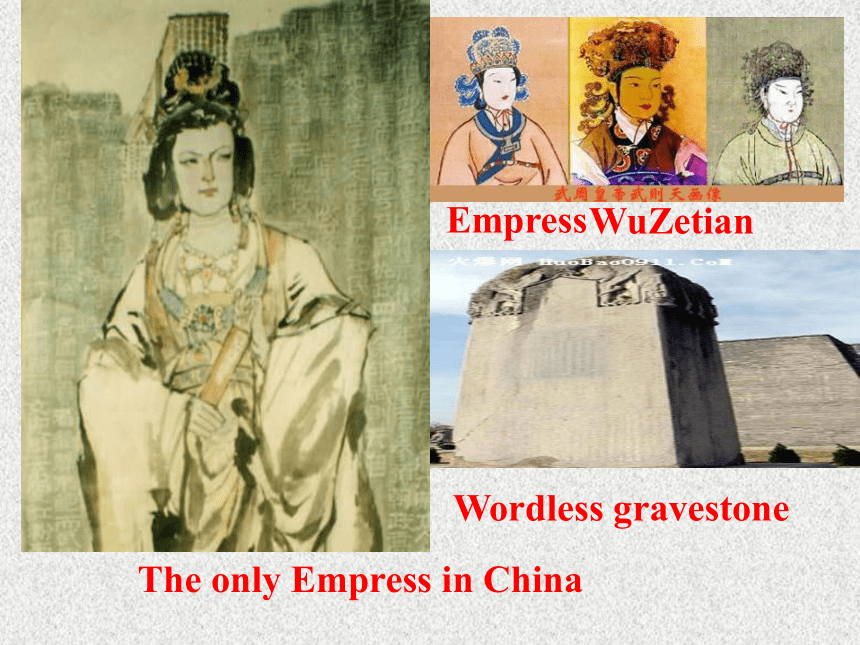
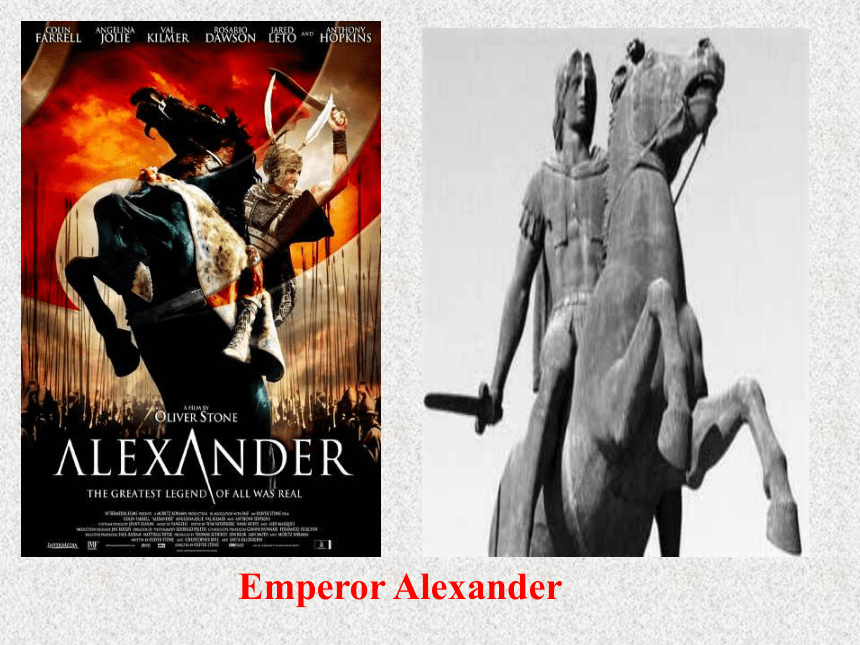
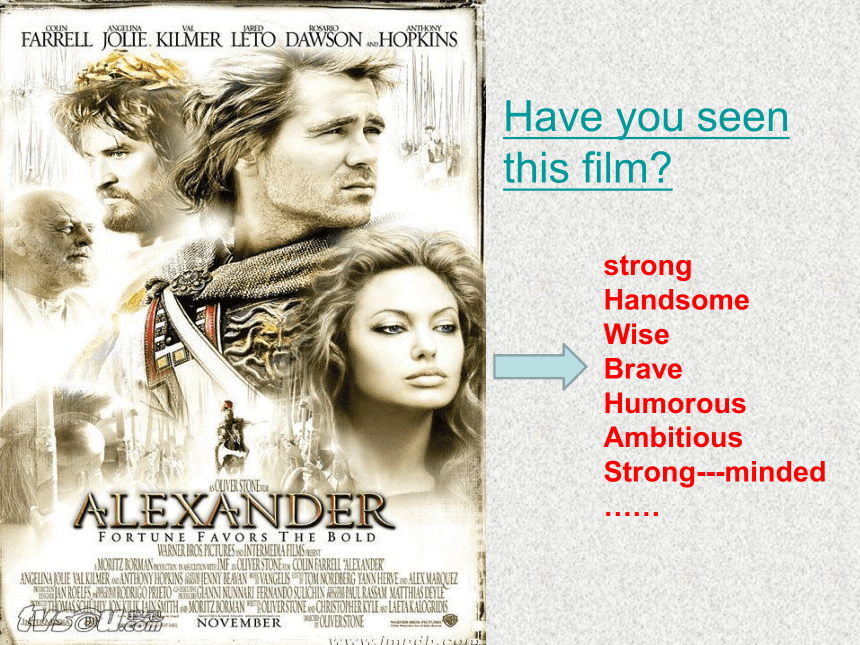
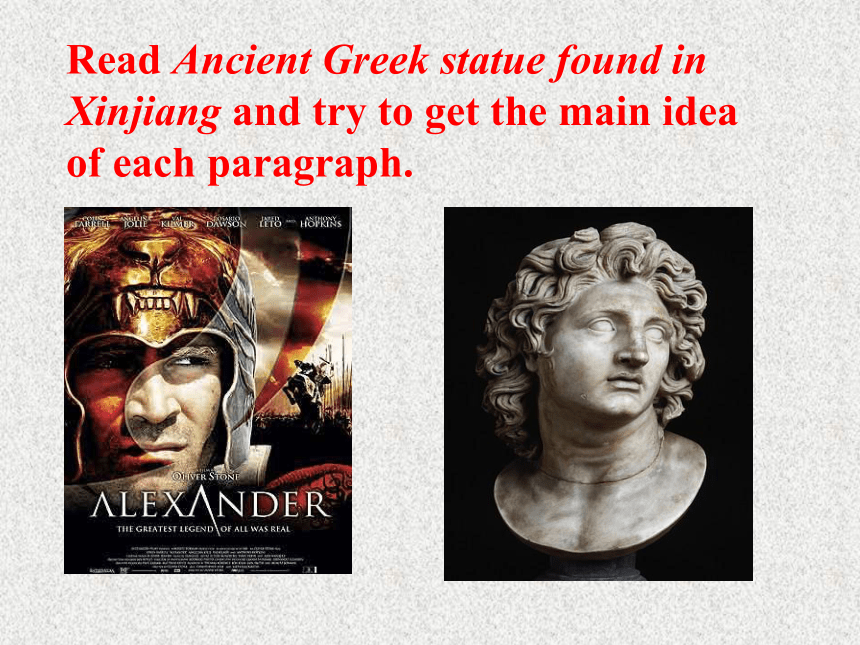
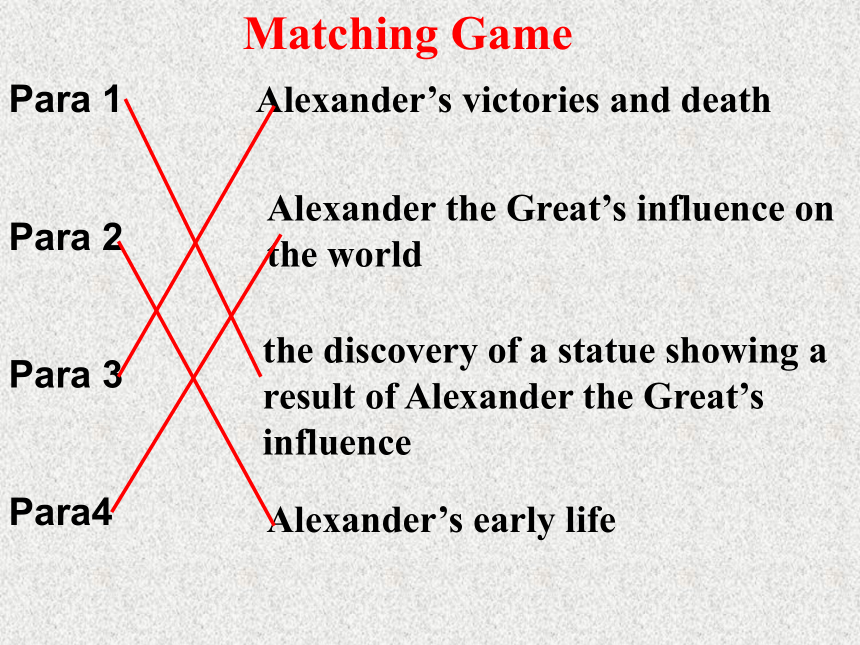
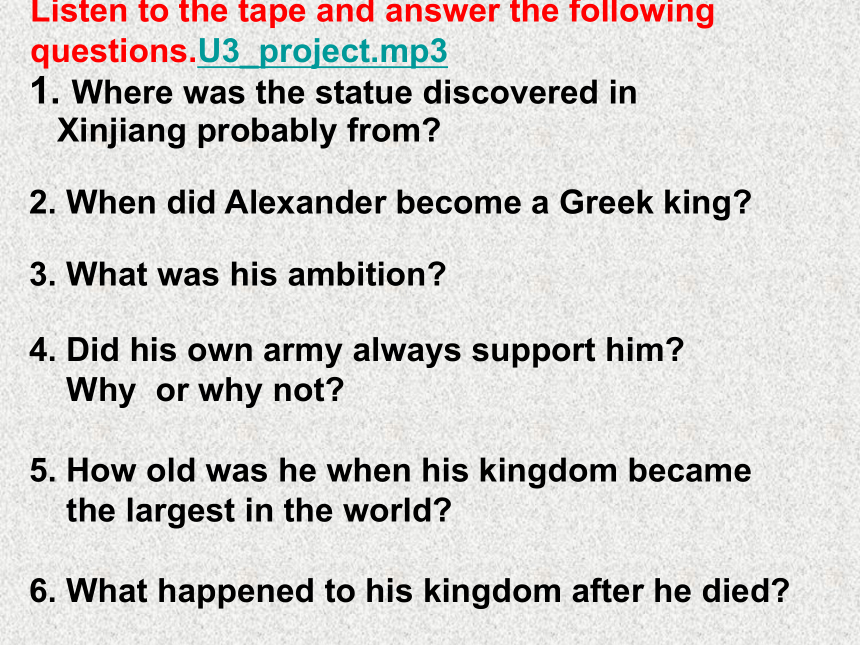
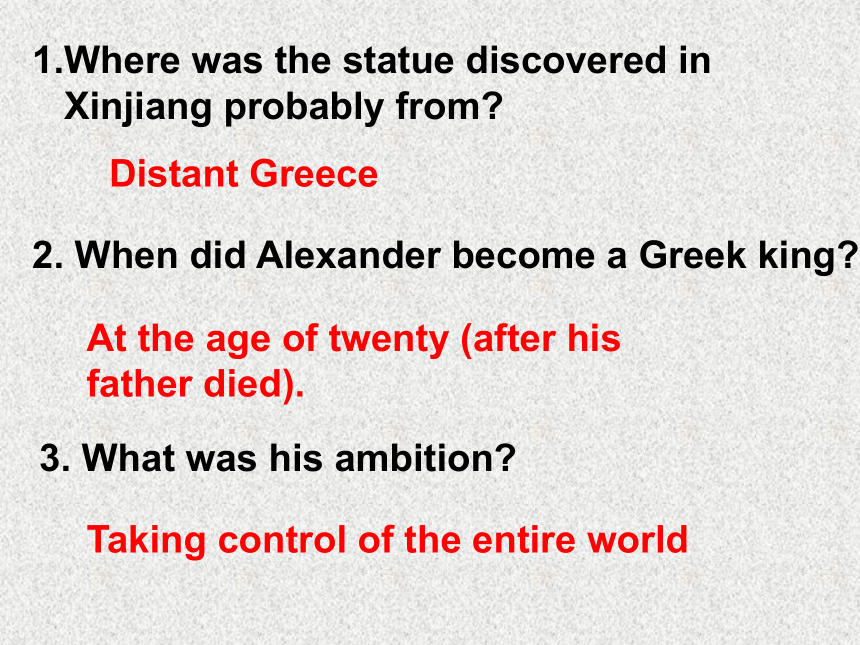
文档简介
课件25张PPT。ProjectBack to the pastM3 U3Making a poster about a historic figureEmperor The Great wall China's first EmperorEmpress Wordless gravestoneThe only Empress in ChinaWuZetian Emperor AlexanderHave you seen this film?strong
Handsome
Wise
Brave
Humorous
Ambitious
Strong---minded
……
Read Ancient Greek statue found in Xinjiang and try to get the main idea of each paragraph.Para 1
Para 2
Para 3
Para4
the discovery of a statue showing a result of Alexander the Great’s influenceAlexander’s early lifeAlexander’s victories and deathAlexander the Great’s influence on the worldMatching Game
1. Where was the statue discovered in
Xinjiang probably from?
2. When did Alexander become a Greek king?
3. What was his ambition?
4. Did his own army always support him?
Why or why not?
5. How old was he when his kingdom became
the largest in the world?
6. What happened to his kingdom after he died?Listen to the tape and answer the following questions.U3_project.mp31.Where was the statue discovered in
Xinjiang probably from?2. When did Alexander become a Greek king?3. What was his ambition?Distant GreeceAt the age of twenty (after his father died).Taking control of the entire world
4. Did his own army always support him?
Why or why not?
5. How old was he when his kingdom became
the largest in the world?
6. What happened to his kingdom after he died?
No, because they grew tired of endless battles He was thirty years old.His generals divided his kingdom among themselves. When sword meets words, which speaks louder?VS In Greece, before Alexander, there was also a great fighter, who, instead of fighting with a sword, fought with words and questions. Who was he?
The father of Western philosophySocratesPara1:
Para 2:
Para 3:
Para 4:
The meaning of__________ Brief ____________ to SocratesSocratic ________Reasons for Socrates’ _____Fill in the BlanksphilosophyintroductionRead The father of Western philosophy and try to get the main idea of each paragraphmethoddeathAnswer the following questions:
1. What does the word “philosophy” mean?
2. How did Socrates teach?
3. What is called the Socratic Method?
4. Why did people take Socrates to court? 1. What does the word “philosophy” mean?
2. How did Socrates teach?
3. What is called the Socratic Method?
4. Why did people take Socrates to court?Love of wisdomSocrates’ way of approaching the truthBy asking questionsFor questioning the existence of the
Greek gods and corrupting the youngCompare Alexander and SocratesSimilarities:both important in history, have great influence on the world …
Differences:ComparisonBoth were important in history, and they had great influence on the world.Status: _________
Influence:_______
Death: ________Status: _________
Influence:_______
Death:______________
Fighter, King CultureDied of feverSoldier, Teacher,
Common worker,
PhilosopherWestern thought and scienceWas forced to drink poisonMake a poster about two famous people who played important roles in history Alexander the Great became king at the age of 20 after his father died. In his own country, he brought many cities back ____ control, which rose up ______ him. In 334 BC, he began to take his army into the Middle East and then Egypt, _______ every army that stood in his path. Then into the east and India, he won victory after victory. However, in 323 BC, he died of fever. He spread the Greek _____ from Europe to Africa and Asia, ______ the world for centuries. Socrates, the father of Western _________, came from Athens in Greece. He was once a soldier, then a teacher but earned his ____ as a common worker. He always taught by asking questions. His way of approaching the ____ is now called the Socratic Method. But whoever he met, he questioned him or her,
______ many people in Athens. At last, some people had had enough of him and took him to court, ______ him to death by forcing him to drink poison.underagainstdefeatingcultureinfluencingphilosophysalarytruthupsettingputtingSentence analysisBy the age of thirty, he had already occupied more land than
anyone before.
By + 时间名词,意为“到…时候”引导时间状语从句的用法
一般情况下,如果从句含过去的时间或谓语动词用一般过去时,
则主句谓语动词用过去完成时(had done);如果从句含将来的时
间或谓语动词用一般现在时,则主句谓语动词用将来完成时(will
have done)。
1. By the time you come here tomorrow, I
_______________(finish) the work.
2. By the time he got to the station, the train_______ (leave).
will have finishedhad left1. In 334 BC, he took his army ,now with 42,000 men, into the Middle East and then Egypt, defeating every army that stood in his path.
2. Then he turned his eyes east, and marched all the way to India, finding victory wherever he went.
3. Alexander the Great spread the Greek culture from Europe to Africa and Asia, influencing the world for centuries to come.
4. He always asked challenging questions to everyone he met, upsetting many people in Athens.
现在分词作状语,分词的逻辑主语与句子的主语保持一致,表示谓语动作所发生的时间,原因,条件,让步,方式,伴随,目的,结果。现在分词做状语,一般有三种形式:
①一般形式,由动词原形+ing 构成
②完成形式,由having+ 过去分词构成
③完成被动式, 由having been + 过去分词构成Fill in the blank with proper words:
The factory keeps giving off smoke, __________ the air polluted. ( make )
_________ a deep breath, they divided into the river. (take)
___________ many times, he didn’t lose heart. ( fail )
_______________ many times , the boy still couldn’t understand the text. (tell)makingTakingHaving failedHaving been toldIn many cases, his questions made his students aware of their own errors.
常见短语:make sb. aware of … 使某人注意到… …
sb. be/ become aware of sth. 意识到… …
be aware that … 知道… …
raise awareness of 提高… …意识
Eg: ① Most smokers ____________ the dangers of smoking.
② People _____________ helping others is helping themselves.
③ Our government has now recognized the importance of __________________ protecting the environment.
are aware of are aware that raising awareness ofWhen asked how a statue from distant Greece could have appeared in China, researchers explained that no doubt this was a result of Alexander the Great’s influence.
该句是一个省略句
将该句子补充完整When__________________asked…
思考:什么情况下使用该类省略?
如果状语从句的主语与主句的主语一致, 或者从句的主语是it, 而且从句有be动词, 从句通常由if/ when/ while/ unless/as/ even if/although引导。
1. When/While ________________in Paris, she picked up a lot of French.
2. The flowers his friend gave him will die unless______ every day.
A.watered B.watering C.water D.to water
Ashe wasthe researchers were 1. In 334 BC, he took his army ,now with 42,000 men, into the Middle East and then Egypt, defeating every army that stood in his path.
2. Then he turned his eyes east, and marched all the way to India, finding victory wherever he went.
3. Alexander the Great spread the Greek culture from Europe to Africa and Asia, influencing the world for centuries to come.
4. He always asked challenging questions to everyone he
met, upsetting many people in Athens.
5. By the age of thirty, he had already occupied more land
than anyone before.
6. In many cases, his questions made his students aware of
their own errors.
7. When asked how a statue from distant Greece could have
appeared in China, researchers explained that no doubt this
was a result of Alexander the Great’s influence.
Homework
Work in small groups. Discuss and research someone famous people in history.
Handsome
Wise
Brave
Humorous
Ambitious
Strong---minded
……
Read Ancient Greek statue found in Xinjiang and try to get the main idea of each paragraph.Para 1
Para 2
Para 3
Para4
the discovery of a statue showing a result of Alexander the Great’s influenceAlexander’s early lifeAlexander’s victories and deathAlexander the Great’s influence on the worldMatching Game
1. Where was the statue discovered in
Xinjiang probably from?
2. When did Alexander become a Greek king?
3. What was his ambition?
4. Did his own army always support him?
Why or why not?
5. How old was he when his kingdom became
the largest in the world?
6. What happened to his kingdom after he died?Listen to the tape and answer the following questions.U3_project.mp31.Where was the statue discovered in
Xinjiang probably from?2. When did Alexander become a Greek king?3. What was his ambition?Distant GreeceAt the age of twenty (after his father died).Taking control of the entire world
4. Did his own army always support him?
Why or why not?
5. How old was he when his kingdom became
the largest in the world?
6. What happened to his kingdom after he died?
No, because they grew tired of endless battles He was thirty years old.His generals divided his kingdom among themselves. When sword meets words, which speaks louder?VS In Greece, before Alexander, there was also a great fighter, who, instead of fighting with a sword, fought with words and questions. Who was he?
The father of Western philosophySocratesPara1:
Para 2:
Para 3:
Para 4:
The meaning of__________ Brief ____________ to SocratesSocratic ________Reasons for Socrates’ _____Fill in the BlanksphilosophyintroductionRead The father of Western philosophy and try to get the main idea of each paragraphmethoddeathAnswer the following questions:
1. What does the word “philosophy” mean?
2. How did Socrates teach?
3. What is called the Socratic Method?
4. Why did people take Socrates to court? 1. What does the word “philosophy” mean?
2. How did Socrates teach?
3. What is called the Socratic Method?
4. Why did people take Socrates to court?Love of wisdomSocrates’ way of approaching the truthBy asking questionsFor questioning the existence of the
Greek gods and corrupting the youngCompare Alexander and SocratesSimilarities:both important in history, have great influence on the world …
Differences:ComparisonBoth were important in history, and they had great influence on the world.Status: _________
Influence:_______
Death: ________Status: _________
Influence:_______
Death:______________
Fighter, King CultureDied of feverSoldier, Teacher,
Common worker,
PhilosopherWestern thought and scienceWas forced to drink poisonMake a poster about two famous people who played important roles in history Alexander the Great became king at the age of 20 after his father died. In his own country, he brought many cities back ____ control, which rose up ______ him. In 334 BC, he began to take his army into the Middle East and then Egypt, _______ every army that stood in his path. Then into the east and India, he won victory after victory. However, in 323 BC, he died of fever. He spread the Greek _____ from Europe to Africa and Asia, ______ the world for centuries. Socrates, the father of Western _________, came from Athens in Greece. He was once a soldier, then a teacher but earned his ____ as a common worker. He always taught by asking questions. His way of approaching the ____ is now called the Socratic Method. But whoever he met, he questioned him or her,
______ many people in Athens. At last, some people had had enough of him and took him to court, ______ him to death by forcing him to drink poison.underagainstdefeatingcultureinfluencingphilosophysalarytruthupsettingputtingSentence analysisBy the age of thirty, he had already occupied more land than
anyone before.
By + 时间名词,意为“到…时候”引导时间状语从句的用法
一般情况下,如果从句含过去的时间或谓语动词用一般过去时,
则主句谓语动词用过去完成时(had done);如果从句含将来的时
间或谓语动词用一般现在时,则主句谓语动词用将来完成时(will
have done)。
1. By the time you come here tomorrow, I
_______________(finish) the work.
2. By the time he got to the station, the train_______ (leave).
will have finishedhad left1. In 334 BC, he took his army ,now with 42,000 men, into the Middle East and then Egypt, defeating every army that stood in his path.
2. Then he turned his eyes east, and marched all the way to India, finding victory wherever he went.
3. Alexander the Great spread the Greek culture from Europe to Africa and Asia, influencing the world for centuries to come.
4. He always asked challenging questions to everyone he met, upsetting many people in Athens.
现在分词作状语,分词的逻辑主语与句子的主语保持一致,表示谓语动作所发生的时间,原因,条件,让步,方式,伴随,目的,结果。现在分词做状语,一般有三种形式:
①一般形式,由动词原形+ing 构成
②完成形式,由having+ 过去分词构成
③完成被动式, 由having been + 过去分词构成Fill in the blank with proper words:
The factory keeps giving off smoke, __________ the air polluted. ( make )
_________ a deep breath, they divided into the river. (take)
___________ many times, he didn’t lose heart. ( fail )
_______________ many times , the boy still couldn’t understand the text. (tell)makingTakingHaving failedHaving been toldIn many cases, his questions made his students aware of their own errors.
常见短语:make sb. aware of … 使某人注意到… …
sb. be/ become aware of sth. 意识到… …
be aware that … 知道… …
raise awareness of 提高… …意识
Eg: ① Most smokers ____________ the dangers of smoking.
② People _____________ helping others is helping themselves.
③ Our government has now recognized the importance of __________________ protecting the environment.
are aware of are aware that raising awareness ofWhen asked how a statue from distant Greece could have appeared in China, researchers explained that no doubt this was a result of Alexander the Great’s influence.
该句是一个省略句
将该句子补充完整When__________________asked…
思考:什么情况下使用该类省略?
如果状语从句的主语与主句的主语一致, 或者从句的主语是it, 而且从句有be动词, 从句通常由if/ when/ while/ unless/as/ even if/although引导。
1. When/While ________________in Paris, she picked up a lot of French.
2. The flowers his friend gave him will die unless______ every day.
A.watered B.watering C.water D.to water
Ashe wasthe researchers were 1. In 334 BC, he took his army ,now with 42,000 men, into the Middle East and then Egypt, defeating every army that stood in his path.
2. Then he turned his eyes east, and marched all the way to India, finding victory wherever he went.
3. Alexander the Great spread the Greek culture from Europe to Africa and Asia, influencing the world for centuries to come.
4. He always asked challenging questions to everyone he
met, upsetting many people in Athens.
5. By the age of thirty, he had already occupied more land
than anyone before.
6. In many cases, his questions made his students aware of
their own errors.
7. When asked how a statue from distant Greece could have
appeared in China, researchers explained that no doubt this
was a result of Alexander the Great’s influence.
Homework
Work in small groups. Discuss and research someone famous people in history.
